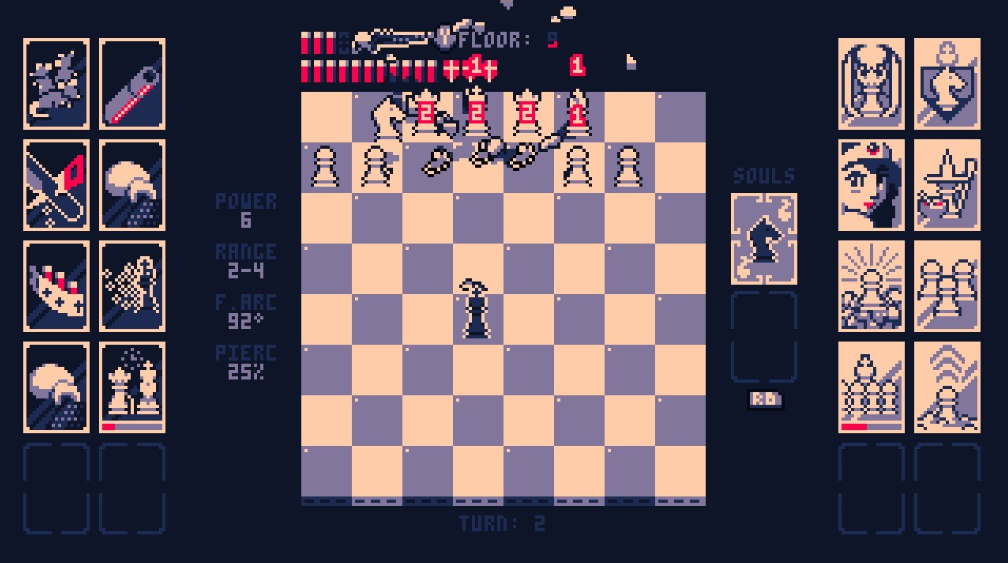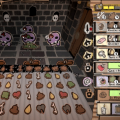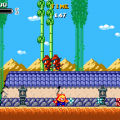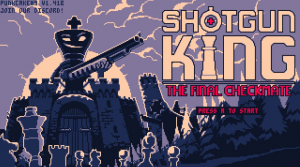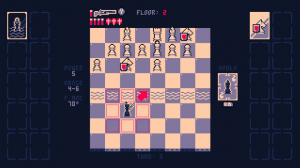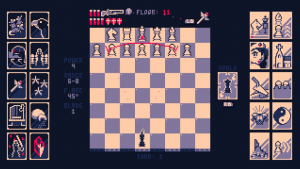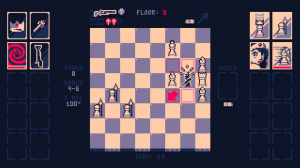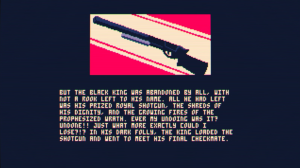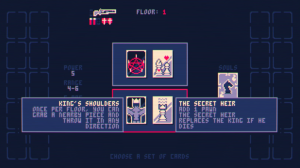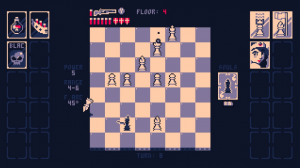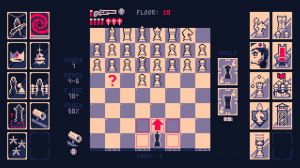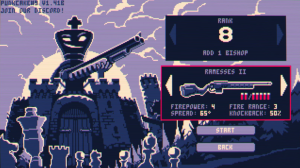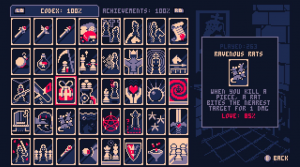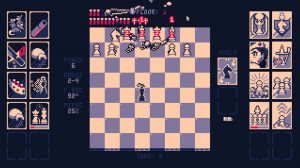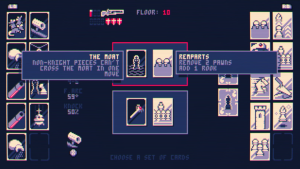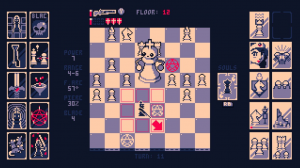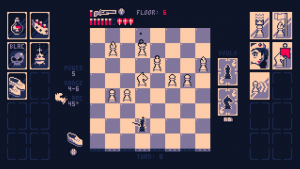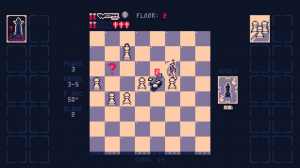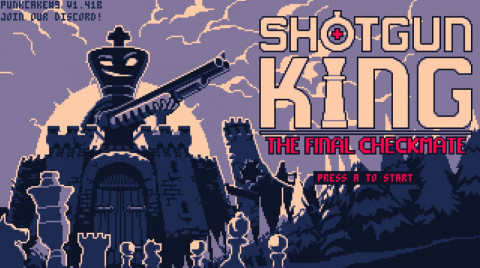
Check out our Top 47,858 Games of All Time episode on Shotgun King!
There are few competitive activities which would not be vastly improved – or at the very least, made significantly more engaging – by giving one of the competitors a shotgun. Arm-wrestling, charades, Magic: The Gathering; none of these have yet reached their full entertainment potential. Nobody understands this philosophy quite like the indie team PUNKCAKE Délicieux, a trio of two French game developers and one Spanish composer, who have been making a name for themselves on Steam and itch.io with unique concepts such as hexadecimal Sudoku, a combine harvester battle-racing game, and their first – and most successful – title; Shotgun King: The Final Checkmate.
When it comes to selecting a base for your indie game to build upon, Chess is one of the most popular selections; behind Sokoban but seemingly ahead of Sudoku and Picross, at least in terms of the number of projects actually worth checking out. The rules are almost universally known, and easy enough to pick up if you somehow don’t know them; bishops can move diagonally, rooks can move horizontally and vertically, queens can do both, and knights can… well, you get the idea. The king is, ironically for what is on paper the most important piece in the game, mostly useless, capable of only moving one space at a time. But as the name “Shotgun King” implies, the black king in this game holds one more key advantage. A 12-gauge advantage with a firepower of 4 and a spread of 55 degrees. And he’s going to need it, since as the hasty cutscene at the beginning of the game explains, the Black king is a pretty terrible ruler who alienated all of his subjects, hence why they switched teams and he finds himself facing them alone, save for his trusty shotgun.
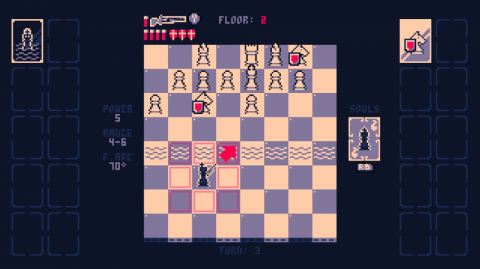
There is only one rule in Shotgun King, and that is to not end your turn while in check, or in a position where you are threatened by another piece. If every piece moved during every turn, this would be a nigh-impossible task as you constantly found yourself surrounded by bishops, pawns and rooks, but fortunately, every piece except for the Black king has its own designated speed, which determines how often it gets to move. Most commonly, this speed is set to once every three turns, although with certain power-ups, pieces can move faster or slower. To give the black king an additional advantage, when destroying a bishop, rook, queen or knight, you gain their soul, which can be used once to move in any way that the piece whose soul you captured could move, i.e. diagonally for bishops, horizontally for rooks; very useful if you ever find yourself pinned down and need to make a quick escape, and you can always follow this up by killing another piece, claiming another soul.
The specific mechanics of the shotgun in Shotgun King are easily digestible enough to instantly jump in and play, but also have a depth that may take you a few attempts to fully understand. Your shotgun has a spread, so your total firepower will rarely be focused on one specific target unless you have narrowed that spread considerably, or you are standing directly next to them. It also has limited range, so you can’t shoot the other pieces down from too far away. You begin with your gun loaded and your ammunition full, and if your gun is ever empty, you will reload by moving to another spot, or you can do so while standing in place. If your ammunition reserves are empty however, it is mandatory to move to another square in order for more ammunition to be added to them, which still needs to be reloaded into your shotgun before you can fire again. And this is just the shotgun you start with; you can unlock four more by getting certain upgrades in your run.
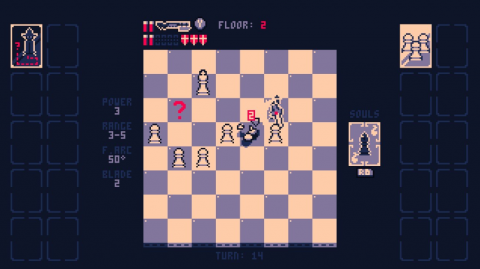
As is the case with many roguelikes, a single mistake is fatal, so Shotgun King has a shield system in place to let the player know when they’re in trouble; these can also be turned off in the menu if you’d rather rely solely on your own wits. If these shields are active, attempting to move the Black king into a position which would be fatal will result in the game removing one of those shields – you can have up to three, and they respawn every turn – while giving you a visual and audio warning to let you know that you’re about to die. These warnings are helpful, but they can also be a touch irritating if the danger in question is a piece that you are actively trying to shoot, and ergo will no longer be a threat to you once they are dead; although, in defense of the warning, if your shot fails to kill the target for whatever reason, then it will indeed kill you, and you’re left with the distinct feeling that the game is thinking “I told you so.” Also, these shields do not warn you if you are targeting a piece which happens to be the only thing protecting you from another piece, such as a pawn blocking the path of a queen, and destroying that pawn will kill you. There’s some debate amongst players as to whether this is a flaw or a feature, but I think it’s for the best that the game doesn’t give you too much help and still requires you to be aware of what’s happening across the board, literally.
These are just the basics though, and where Shotgun King thrives are the upgrades. At the end of every stage, you are given two pairs of cards to choose from; a black card which benefits you, and a white card which benefits the enemy. Shotgun King takes cues from other classic roguelikes like The Binding of Isaac and Enter The Gungeon by having some traditional, standard power-ups for both sides, such as increasing your firepower or range, adding an extra knight or bishop, spawning an extra pawn every five turns, and so on. But the gameplay additions soon take on a weird and wonderful quality when you’re offered the ability to fire every bullet in your gun at once. Too simple? A moat, then. An entire moat across the fifth row of the board, which no pieces (except for knights) can cross in a single turn. What about spawning a rat every time you destroy a piece, which then attacks the closest enemy piece, possibly spawning another rat in the process? Or once per turn, the capability to hop directly over an adjacent enemy, dealing one damage, and then continuing your turn; not the flashiest move, but incredibly helpful at getting out of danger. Or, once per floor, the choice to lift a single adjacent piece up, and just throw it at another enemy? Or better yet, directly off the board for a free kill? Why even stick to your shotgun alone when grenades, swords, and wands of various effects are also available? It’s important to remember though, that these cards come in pairs; a very advantageous black card may be paired with a white card which, in your current situation, may effectively serve as a death sentence.
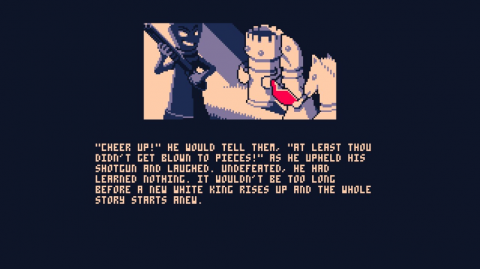
To counter these abilities, the enemy will also be receiving a variety of interesting power-ups, including but not limited to; making queens completely invincible but significantly lowering their speed, giving rooks the ability to protect pieces near them from taking more than one damage per attack, giving bishops the ability to move in all eight directions – and also to fly – or turning one of the pawns into the king’s secret heir who will take his place if he dies. Which brings me onto one of the toughest decisions in the game; just like in real chess, the match is over as soon as either king is dead, so if you’re lacking survivability but packing some serious firepower, a completely valid strategy is to make a beeline straight for the enemy king and blast them into pieces as quickly as possible, ending the floor immediately. This still works on the final boss, a giant 2×2 square version of the White king with increased health.
Like most roguelikes, the only real annoyance from the game comes from luck. It is entirely possible, albeit only on the game’s higher difficulty settings – of which there are fifteen to choose from, and which are unlocked by beating the previous difficulty setting – to simply not have the tools necessary to succeed. Some of the guns, several achievements, and even the secret final boss all require you to get very specific cards during your run, and with fifty-five black and white cards each, some of which can be chosen multiple times on the same run, getting three or four specific cards to show up is not impossible, but it is entirely out of the player’s control, which is never a good thing for a bonus challenge.
Ultimately though, Shotgun King is a fun, quirky idea, but with clear months of effort – if not years, the developers still have more free updates planned more than two years after its release – and intelligent design behind it. It’s not just “chess with a shotgun”; it’s a very finely made puzzle-strategy game with a unique concept, dozens of hours of replayability, and a keen sense of humor. It takes a very special vision to unite people who enjoy chess, and people who get a few moves in and then want to blast the board with a shotgun, but Shotgun King: The Final Checkmate fulfils that goal. Check and mate.
